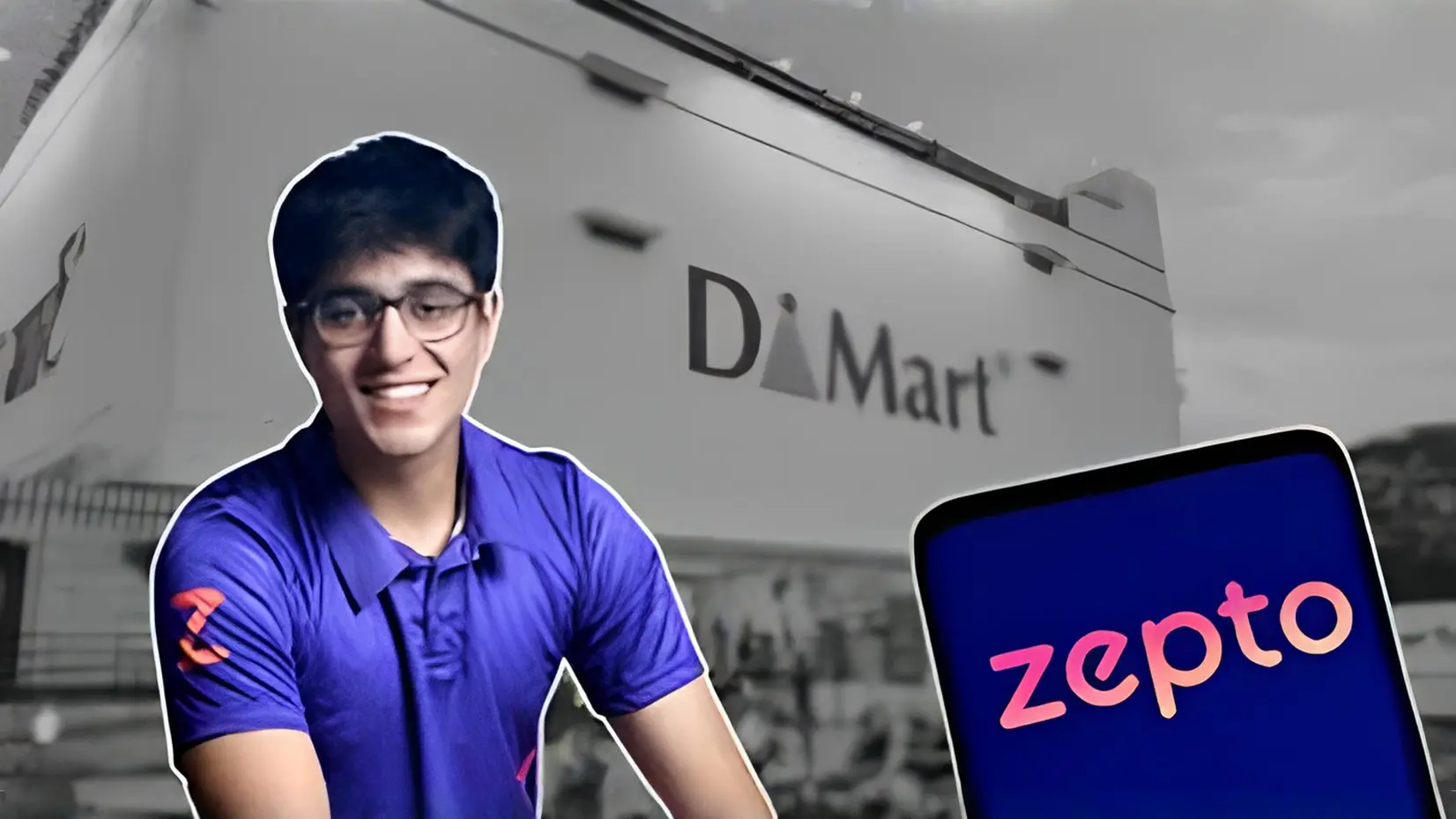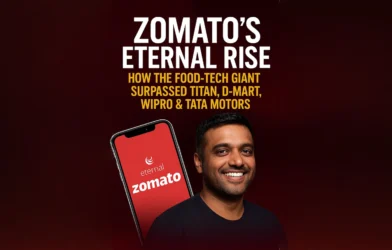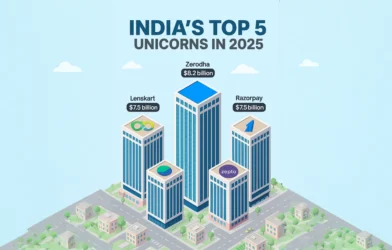Author: Dev Patel | EQMint | General News
Mumbai, October 2025: India’s fastest-growing quick commerce company, Zepto, has achieved a major milestone by raising $450 million in a fresh funding round, pushing its valuation to an impressive $7 billion. Just a day after the announcement, co-founder and CEO Aadit Palicha addressed nearly 5,700 employees in an internal town hall meeting, drawing parallels between Zepto’s growth journey and that of India’s retail powerhouse DMart.
The town hall, described by employees as “energized yet introspective,” came at a defining moment for Zepto. The company, founded in 2021 by two Stanford dropouts — Aadit Palicha and Kaivalya Vohra — has rapidly emerged as a leader in the ultra-fast grocery delivery sector, transforming the way urban India shops for essentials.
A $7 Billion Milestone in Just Four Years
The $450 million fundraising round, one of the largest in India’s startup ecosystem this year, was led by existing and new global investors. With this infusion, Zepto’s valuation has nearly doubled, cementing its place among India’s most valuable private startups.
The funds are expected to drive network expansion, profitability initiatives, and logistics optimization, with a particular focus on scaling Zepto Café — the company’s newly launched 10-minute café and beverage vertical.
“Zepto’s valuation at $7 billion isn’t just about investor optimism — it’s about sustained consumer behavior,” said a venture analyst tracking the sector. “The company has managed to blend speed, reliability, and scale in a way few global peers have.”
Inside the Town Hall: “We’ve Cracked Proximity, But Not Value”
In his post-fundraise address, Palicha reflected on Zepto’s growth journey and the challenges ahead. According to employees present, he said:
“We have cracked proximity, but yet to crack value. DMart, the retail giant, has cracked value but not proximity.”
The statement resonated across the room — a reminder that Zepto’s biggest advantage lies in its hyperlocal delivery network, but its next frontier is building long-term value efficiency akin to traditional retail players like DMart.
DMart, India’s largest grocery retailer, was founded by billionaire Radhakishan Damani and is known for its deep discounting model and razor-thin operational efficiency. Palicha’s comparison suggested that Zepto, like DMart in its early days, is at a pivotal juncture — moving from rapid scale to sustainable profitability.
“Cracking proximity” refers to Zepto’s unmatched delivery speed — 10 minutes or less — achieved through an expanding network of dark stores across India’s top metros. However, the “value” Palicha referred to signals the need to deliver better pricing, product range, and repeat margins to stay ahead of the competition in a capital-intensive market.
From Speed to Sustainability
In the last two years, Zepto has evolved from being a hypergrowth story to one chasing long-term stability. The company claims to have achieved operational profitability in multiple cities, including Mumbai, Bengaluru, and Delhi NCR, and expects to turn EBITDA positive by 2026.
According to internal sources, Zepto’s dark store network now covers more than 200 micro-warehouses nationwide, delivering millions of orders monthly. The latest funding will help optimize these operations further while deepening penetration in Tier-2 markets.
Palicha emphasized that the new capital would not be used for unsustainable expansion but rather for “building the most efficient supply chain in India.” Employees said the tone of the meeting reflected cautious optimism — an acknowledgment that the era of “growth at all costs” is over, replaced by data-driven execution and financial prudence.
Zepto and DMart: Parallels and Contrasts
The comparison between Zepto and DMart is both symbolic and strategic. DMart’s early success was built on value efficiency — offering lower prices through bulk sourcing and minimal frills. Zepto, on the other hand, has mastered proximity efficiency, delivering in record time by optimizing location density and real-time inventory algorithms.
Both companies share a customer-first philosophy but operate at opposite ends of India’s retail evolution. DMart represents traditional brick-and-mortar value; Zepto embodies digital-age convenience.
Palicha’s acknowledgment of DMart’s strengths signals a shift in Zepto’s ambition — from being a quick-delivery app to becoming a retail ecosystem capable of generating repeat profitability and consumer trust at scale.
“Zepto is standing today where DMart once stood in its journey — on the edge of transformation from a fast-scaling company to a sustainable retail powerhouse,” said a retail industry observer.
Zepto’s Path Forward
The $450 million funding will accelerate Zepto’s next phase of growth, with three primary objectives:
-
- Profitability Focus: Streamlining dark store operations and optimizing delivery density to achieve positive unit economics nationwide.
- Product Diversification: Expanding Zepto Café and ready-to-eat offerings to capture higher-margin categories.
- Technology Enhancement: Investing in predictive logistics, demand forecasting, and inventory management tools powered by AI.
Palicha also hinted at plans to expand Zepto’s employee ownership program, rewarding long-term contributors as the company matures.
Internally, Zepto’s leadership is also emphasizing culture and efficiency — shifting from hypergrowth mode to a disciplined operating mindset. Employees described the town hall as a “turning point,” signaling a company preparing for the long game.
Investor Confidence Remains Strong
Zepto’s rise has attracted some of the world’s leading venture capital firms and sovereign investors. The company’s consistent growth in order volume, customer retention, and average order value has made it one of India’s few startups to sustain momentum in a challenging funding climate.
Investors have praised Zepto’s founder-led agility and operational focus, traits that have allowed the firm to weather market headwinds that affected other quick commerce players. The recent fundraise is seen as a strong validation of the company’s fundamentals and vision.
The Bigger Picture: Quick Commerce in India
India’s quick commerce sector, estimated to be worth over $6 billion in 2025, is projected to grow at a compound annual rate of 40% over the next five years. With major players like Swiggy Instamart, Blinkit, and BigBasket Now competing for market share, the battle for speed, convenience, and cost efficiency is intensifying.
However, Zepto’s consistent operational discipline and strong brand recall have helped it emerge as the market leader in metro regions. If its profitability roadmap materializes as planned, the company could set a new benchmark for sustainable growth in quick commerce.
Conclusion
Zepto’s latest $450 million funding marks more than just another milestone in India’s startup story — it represents the maturing of the quick commerce sector itself. Aadit Palicha’s comparison to DMart underscores a deeper realization: speed alone isn’t enough; enduring value must follow.
As Zepto enters its next phase, balancing speed with scale and efficiency, it appears poised to define what the next generation of Indian retail will look like — fast, smart, and sustainable.
For more such information visit EQMint
Disclaimer: This article is based on information available from public sources. It has not been reported by EQMint journalists. EQMint has compiled and presented the content for informational purposes only and does not guarantee its accuracy or completeness. Readers are advised to verify details independently before relying on them.






